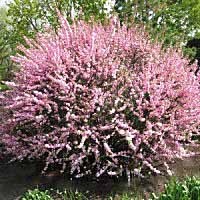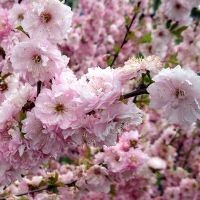Shrubs add many important aspects to the landscape. They add colour, texture and form to any garden. These beautiful flowering shrubs add interest to the garden early in the season.
Double Flowering Plum
Prunus triloba var. multiplex
Prunus triloba var. multiplex
Height: 1.8-2.1cm
Spread: 1.8-2.1m
Bloom: Early
Spring, pink blossoms, about two weeks
Fruit: None
Growth Rate: Slow
to medium
Life Span: short
Zone: 3
Growing: Double
Flowering Plum needs at least 6 hours of direct sunlight to bloom properly. It
looks great as a feature shrub, in an informal hedge and the back of a border.
This shrub should be pruned right after it leafs out. It will need to be
thinned out to promote new growth. It usually blooms on one to three year old
wood. Grow Double Flowering Plum shrubs in protected areas, because the flower
buds will die in -35°C or extreme temperature.


American Hybrid Lilac
‘Mount Baker’
Syringa x hyacinthiflora ‘Mount Baker’
Syringa x hyacinthiflora ‘Mount Baker’
Height: 3-3.7m
Spread: 3-3.7m
Bloom: Early
Spring, White single flowers
Fruit: Capsules
Growth Rate: Medium
Life Span: Long
Zone: 3
Growing: Mount
Baker grows well in sun to light shade. It makes the most impact in the garden
as a hedge, in shrub beds and as a screen. It is one of the first lilacs to
bloom with its white flowers that are perfectly displayed against its dark
green foliage.

WATCH OUT!
Forsythia
Forsythia x Forsythia
Forsythia x Forsythia
This shrub has amazing yellow flowers that bloom before it
leafs out, but the blooms are not fully hardy. This means Forsythia may not
bloom every year because of low temperatures.
Height: 1.8-2.7m
Spread: 1.8-2.7m
Bloom: Early
Spring, Yellow flowers
Fruit: not
noticeable
Growth Rate: Fast
Lifespan: Short
Zone: The shrub
is zone 3 and the flower buds are zone 4.
Growing: Forsythia
needs sun to light shade and flowers the best in full sun. It does not grow
well in clay soil, but does well in loose, moist, well draining soil. It looks
great in an informal hedge or as a background shrub. Prune Forsythia after it
has bloomed to promote new growth and to remove thick old growth. Plant this
shrub in a well protected area and cover it with snow for the best chance of
getting beautiful blooms.


Prune That Puppy!
This is an awesome simple YouTube guide for pruning spring flowering shrubs. It even describes how to prune Lilacs and Forsythia!
http://www.youtube.com/watch?v=X8bQjoPgLVk
Another awesome blog post! I like this for a number of reasons, and not just because it has beautiful pictures but also for the information. I think how you included care in this, what time to prune these back as well as a video but also what type of wood it blooms on. I know that a lot of people get confused by this and prune at the wrong time. I also like how you mentioned climate, the temperature in which you will get winter kill and what kind of conditions the shrubs like to grow in. The set up again is great, pros and cons to shrubs, it’s a good tool for the home owner.
ReplyDeleteI have to agree with Erin, its really is another great entry! One particular thing that stood out was the growth rates. In my time working with shrubs and trees I have often been asked about this area, so I know that it will be appreciated by anyone reading up on these plants. I really do love you 'Watch Out' section, and already find that I first jump down to read it over, excited to see this weeks installment. Its a good way to keep readers coming back. Pictures were lovely, and the pruning practices are a genius idea as most people don't realize its importance. A small bit of advice though would be to make your video URL's into links. I know it sounds sad, but most people are lazy and won't copy paste URL. Wonderful post!
ReplyDeleteGood work, But Tristyn is right, you will have to ensure that the reader can click and go directly to the video, or it won't happen!
ReplyDeleteMaybe a bit of further information on Forsythia, the fact that it is winter hardy here, but in all likelihood, the immature buds will be burned off from the reflection off the snow in late winter/early spring.
We will figure out your YouTube links to make sure they work
ReplyDelete